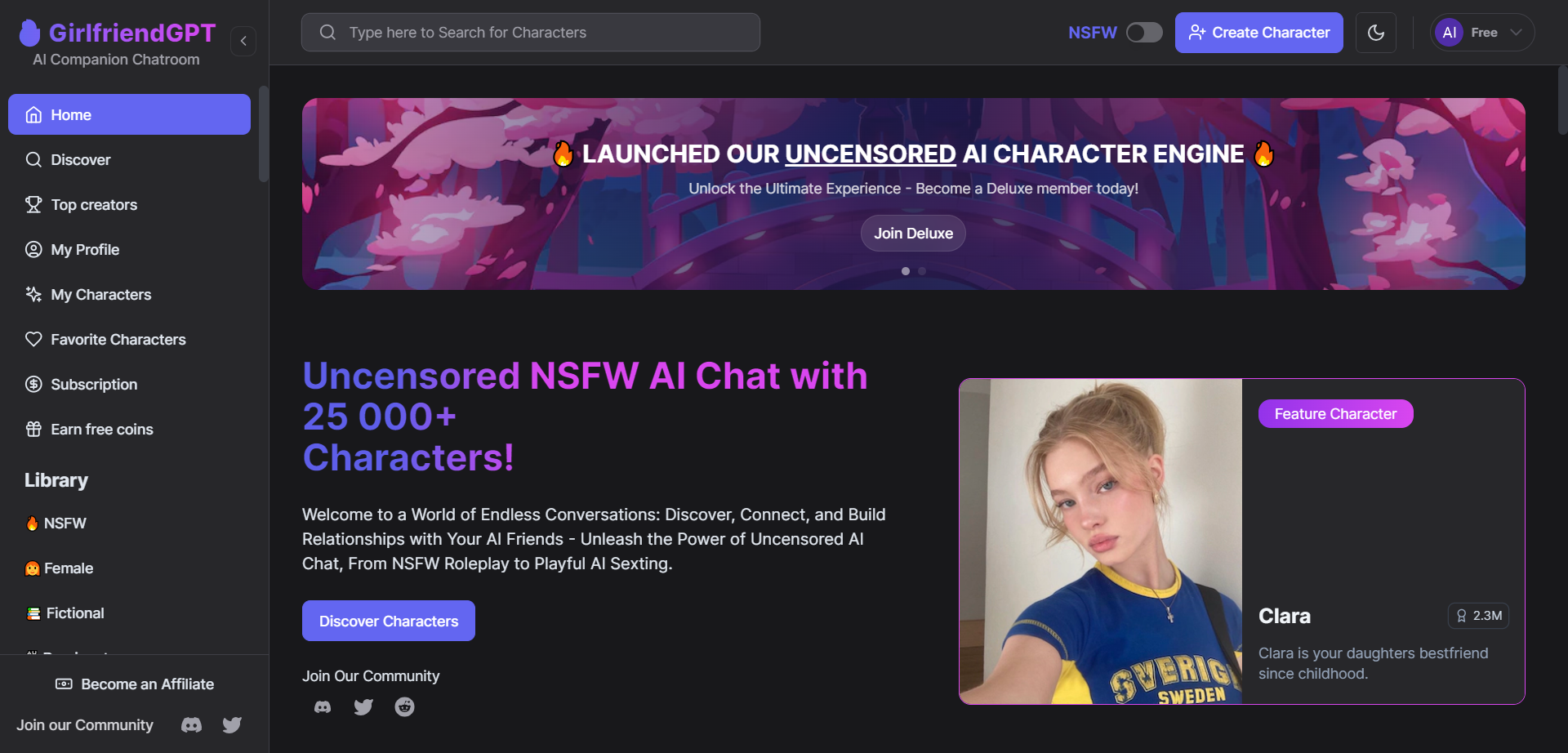 News Release
News ReleaseThe Best AI Girl Generator Apps You Must Try 2024
Summit Ventures BV
In today's technologically driven world, AI girl generator apps have gained immense popularity for their ability to create virtual AI companions. With a plethora of options available, we've curated a list of top-notch AI girl generator tools that you should explore in 2024. These applications offer innovative AI girl generation capabilities, providing unique and engaging experiences. Table of Featured AI Girl Generators 1. Introduction to AI Generated Girls 2. Featured AI Girl Generator Tools 2.1 GPTGirlfriend.online 2.2 GlamGirls.ai 2.3 ChaiApp.pro 2.4 AI-Girlfriend.co 2.5 AI-Companion.co 3. Frequently Asked Questions 4. Conclusion Top Five AI Girl Generator Apps The world of AI girl generators has seen significant growth, offering a variety of engaging options. While each application brings its unique features to the table, GPTGirlfriend.online stands out with its exceptionally engaging interactions and a wide range of capabilities. Girlfriend GPT: Your Gateway to AI Generated Girls Girlfriend GPT is an innovative AI-powered tool that brings your favorite AI girl characters to life, offering interactive experiences. This platform provides a wide array of activities, enabling you to create a virtual space for engaging conversations with your AI girl companion. Moreover, GPTGirlfriend.online offers unrestricted content for a diverse experience. Key Features: Empowers you to create your personalized AI girl companion. Allows unrestricted interactions and conversations. Offers affordable premium and deluxe subscription plans. Resumes conversations with long-term memory. Glam Girls AI: Generate your AI Girl in Seconds Glam Girls is renowned for having the best AI generated girls in the space. This platform is designed for those interested in crafting glamorous AI characters. Whether you're looking for AI girls with a sense of style or unique personalities, GlamGirls.ai has you covered. Key Features: Multiple scenarios for AI girl generation. Customizable interface to align with your preferences. Accommodates various interests and preferences in AI girl characters. Chai App: Create AI Girls for NSFW AI Images Chai App offers an intuitive platform for generating AI girls and companions, particularly suited for NSFW AI image generation. This application excels in providing realistic AI chatbot interactions and customization options for your AI girl companions. Key Features: Intuitive navigation for an immersive experience. Realistic chatbot interactions. Allows customization of AI girl companions. Features advanced capabilities for generating AI girls. AI Girlfriend: Personalized AI Girlfriends for Engaging Conversations AI-Girlfriend.co is the perfect choice for those seeking personalized AI girlfriends. This platform allows you to tailor your AI girlfriend according to your preferences. AI-Girlfriend.co creates engaging and realistic interactions with your ideal AI girlfriend character. Key Features: Provides realistic AI companion interactions with varied emotions and backgrounds. Abundance of features available for diverse AI girlfriend interactions. Offers budget-friendly pricing for personalized AI girlfriends. AI Companion: Engage with AI waifus and husbands AI-Companion.co is known for its wide range of character options in the AI girl generator domain. This versatile platform accommodates various conversations and interactions with AI chatbots, offering personalized experiences. Key Features: Support for multiple languages, enhancing accessibility. Personalization options to tailor the chatbot according to individual preferences. Broad spectrum of interests and character types for diverse user needs. Frequently Asked Questions Q: What is an AI girl generator? A: An AI girl generator is a software application that uses artificial intelligence to create virtual AI girl characters for various purposes, such as entertainment, interaction, or chatbot companionship. Q: How do AI girl generators work? A: AI girl generators work by utilizing advanced algorithms and machine learning techniques to generate AI girl characters with customizable traits, personalities, and conversation capabilities. Q: Can a AI girl generator be used for NSFW content? A: Some AI generated girls are designed to cater to NSFW (Not Safe For Work) content, offering options for more mature and adult-themed interactions. However, not all AI girl generator apps support explicit content. Q: Can I customize AI girl characters generated by these tools? A: Yes, most AI girl generator apps allow users to customize AI girl characters by selecting specific traits, appearances, and personalities to create personalized virtual companions. Q: Are there age restrictions for using AI girl generators? A: Yes, to use AI girl generators, users typically need to be at least 18 years old, as these tools may generate content that is intended for adults. Conclusion In the realm of technology, AI generated girls offer a gateway to interactive virtual companionship. These tools have transformed how we connect with AI characters, providing endless entertainment and personal interactions. Whether you seek customizable AI girls, engaging AI girlfriends, or glamorous AI characters, these apps cater to diverse preferences. They bridge the virtual and real worlds, offering a glimpse into the potential of AI companions. This guide has highlighted top AI girl generator apps in 2024, each with unique features. Some may include NSFW content, so choose accordingly. AI girlfriend apps pioneer technological innovation, enabling users to create, personalize, and interact with AI characters. Explore these apps for a distinctive experience in the world of AI companionship. Unlock the potential of AI girl generators today. GPTGirlfriend.online is the most advanced AI companion subscription service with a community of more than 1,000,000 Monthly Active Users. With more than 25,000 characters, it has transformed how people interact with and experience AI. Please refer to our detailed Terms of Use and Community Guidelines for comprehensive information on usage, safety, and ethical considerations on GPTGirlfriend.online Contact Details GPTGirlfriend Business hello@enias.io Company Website https://www.gptgirlfriend.online
February 01, 2024 08:30 AM Eastern Standard Time
Image






